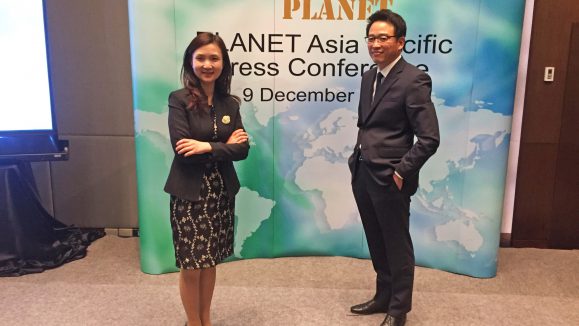Among older adults, age-related macular degeneration (AMD) is one of the common causes of acute vision loss. Neovascular AMD (nAMD) is an advanced stage of the condition, which is responsible for the most acute vision loss. Meanwhile, polypoidal choroidal vasculopathy (PCV) primarily affects pigmented individuals. Currently, studies have demonstrated that the anti-VEGF therapies used for AMD may help improve vision in patients with PCV.
The medical retina symposium during the 33rd Asia-Pacific Academy of Ophthalmology Congress (APAO 2018) in Hong Kong, on extending horizons in the management of nAMD and PCV was chaired by Dr. Chan Wai Man from Hong Kong University. The symposium began with a presentation on the management of PCV, with a special focus on the PLANET study, by Prof. Wong Tien Yin from the Singapore National Eye Center.
According to Dr. Chan, PCV affects people of all ethnicities, but is more prevalent in the Asian community. Among patients with nAMD diagnosed with PCV, high percentages are Japanese (23%-55%) and Taiwanese (49%). Aflibercept monotherapy results in good outcomes across multiple PCV studies.
The objective of the PLANET study was to determine the efficacy and safety of aflibercept monotherapy vs. aflibercept with rescue photodynamic therapy (PDT) in subjects diagnosed with PCV, and also to determine whether aflibercept monotherapy is non-inferior to aflibercept with rescue PDT based on best corrected visual acuity (BCVA) in subjects diagnosed with PCV. It was a randomized, double-masked, sham-controlled, multicenter Phase IIIb/IV clinical trial conducted across 62 sites. The study concluded that aflibercept monotherapy leads to favorable vision gains and high rates of polyp inactivity. Two-year data from the study demonstrated that aflibercept monotherapy is non-inferior to aflibercept + active rescue PDT.
Then Dr. Masahito Ohji from Shiga University of Medical Science in Japan spoke on treatment approach in nAMD, with a special emphasis on the ALTAIR Study. He elaborated on the anti-VEGF therapy for nAMD, including fixed injections (monthly or bimonthly), pro re nata (PRN) (as needed), and treat and extend (T&E). The ALTAIR Study is a randomized, open-label Phase IV study evaluating the efficacy and safety of repeated doses of aflibercept with variable treatment intervals in patients with nAMD, performed at 40 sites in Japan. The primary objective of the study was to assess the efficacy of aflibercept with two different T&E dosing regimens for nAMD in Japan. Meanwhile, the secondary objective was to assess the safety of aflibercept with two different T&E dosing regimens for nAMD in Japan for up to two years.
Dr. Won Li Kee from Seoul St. Mary’s Hospital, the Catholic University of Korea, presented on the management of PCV – a clinician’s perspective. He found that aflibercept monotherapy results in good outcomes across multiple PCV studies, and anti-VEGF monotherapy has advantages over the anti-VEGF + PDT combination in the treatment of PCV. Anti-VEGF monotherapy avoids potential side effects associated with long-term PDT treatment. Over two years in the PLANET study, patients achieved vision gains of approximately 10 letters, despite 83% not requiring PDT. Moreover, drug-induced complete polyp regression and polyp inactivation is achievable.
In his summary, the chairperson of the symposium, Dr. Chan Wai Man, discussed two recent reviews on the treatment of PCV and nAMD relevant to the Asia-Pacific region. He also spoke about extending the horizons in the management of nAMD and PCV.
Editor’s Note: A version of this article first appeared at the APAO 2018 Show Daily Issue 3, the official conference news of APAO 2018 (Hong Kong) published by PIE Magazine (www. piemagazine.org).



